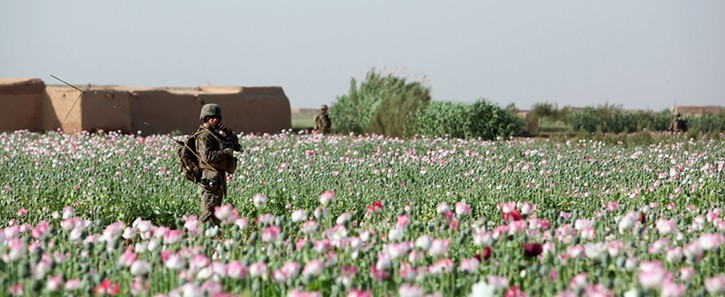

$8.5 Billion U.S. Counter Narcotics Effort in Afghanistan Boosts Opium Production


The U.S. government’s multi-billion-dollar effort to counter narcotics in Afghanistan is a humiliating failure that’s resulted in a huge increase in poppy cultivation and opium production. Despite the free-flow of American tax dollars to combat the crisis, opium production rose 43% in the Islamic nation, to an estimated 4,800 tons, and approximately 201,000 hectares of land are under poppy cultivation, representing a 10% increase in one year alone.
Uncle Sam’s embarrassing counter narcotics effort is part of a broader and costly failure involving the reconstruction of Afghanistan. More than $100 billion have been dedicated to help rebuild the war-torn country and much of it has been lost to waste, fraud and abuse not to mention corruption. The drug initiative is a recent example, documented by the Special Inspector General for Afghanistan Reconstruction (SIGAR) in a quarterly report to Congress. The document is painful to read because it goes on for 269 pages, but Judicial Watch created a link for the counter narcotics section, which is around 19 pages and includes informative charts, graphs and the latest available statistics.
As of December 31, 2016, the United States has spent an astounding $8.5 billion for counter narcotics efforts in Afghanistan since 2002, the report reveals, making it clear that the cash will continue flowing. “Nonetheless, Afghanistan remains the world’s leading producer of opium, providing 80% of the global output over the past decade, according to the United Nations,” SIGAR writes. The watchdog includes statistics from the United Nations Office of Drugs and Crime (UNODC) confirming a 10% increase in the amount of Afghan land that was under poppy cultivation between 2015 and 2016. Despite Uncle Sam’s generosity, poppy eradiation results were the lowest this decade, the watchdog states. “No eradication took place in the biggest opium-growing provinces because of the grave security situation,” the report reveals, noting a steady rise in production and cultivation in the past decade. “Eradication efforts have had minimal impact on the rise in illicit opium cultivation.”
This, of course, translates into a large increase in opium production—43% in a year—the watchdog reveals, to an estimated 4,800 tons. “The reported production increase reflected the larger area under cultivation, higher yields, and lower eradication results.” Part of the problem, U.S. authorities say, is that between 2.5 and 3 million Afghans are drug users and the country lacks sufficient treatment centers to address the growing drug-abuse problem, particularly for women and children. American cash hasn’t put a dent on that problem either. A State Department branch known as the Bureau of International Narcotics and Law Enforcement Affairs (INL) doled out $12.9 million in 2015 for drug treatment and education programs in Afghanistan and has allocated millions more despite past failures. INL also funds a scandalous, multi-million-dollar program called Governor-Led Eradication (GLE) that pays provinces for the cost of eradicating poppies. Between 2008 and 2016 INL disbursed $4.6 million, according to the SIGAR.
Afghanistan reconstruction has been a huge debacle that continues fleecing American taxpayers. Judicial Watch has reported on the various boondoggles over the years, most of them documented in tremendous detail by the SIGAR. Highlights include the mysterious disappearance of nearly half a billion dollars in oil destined for the Afghan National Army, a $335 million Afghan power plant that’s seldom used and an $18.5 million renovation for a prison that remains unfinished and unused years after the U.S.-funded work began. Among the more outrageous expenditures are U.S. Army contracts with dozens of companies tied to Al Qaeda and the Taliban. The reconstruction watchdog recommended that the Army immediately cut business ties to the terrorists but the deals continued. Another big waste reported by Judicial Watch a few years ago, involves a $65 million initiative to help Afghan women escape repression. The government admits that, because there’s no accountability, record-keeping or follow-up, it has no clue if the program was effective.















